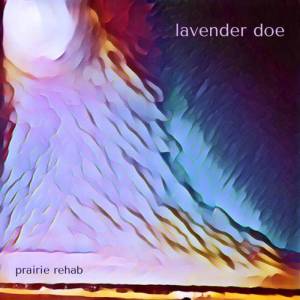If there’s one thing that true crime TV has taught us, it’s how easy it is for murderers to hide in plain sight, to disguise their dark side under a façade of tranquility. This dichotomy of gruesome rage bubbling up under a peaceful veneer comes to life in “Lavender Doe,” the new music video from Prairie Rehab, which The Arts STL is proud to debut below.
Formed when the remainder of beloved St. Louis band the Linemen joined up with singer/guitarist Lacie Williams through a Craigslist ad, Prairie Rehab has conjured up half a dozen well-received albums in their dozen-ish-year career. The band is often filed under folk or Americana, but musically the band never seems hemmed in by the strictures of those genres, and Williams’ erudite, impressionistic lyrics are similarly adventurous.
Sonically, “Lavender Doe” is as pretty and gentle as its name. The song opens with a chiming guitar figure that recalls the majestic intros of the Beatles “I Want You (She’s So Heavy)” or Aerosmith’s “Last Child,” and those sparse, ringing notes carry over into the verses, joined by a stutter-step drumbeat that gives the song a hint of a country kick and Williams’ lilting, quavering voice.
Yet as gentle as the song sounds, its lyrics take a turn to the malevolent. “Lavender Doe” was loosely inspired by two real-life murders, part of what Williams jokingly calls “my earnest (yet admittedly basic-bitchy) interest in the world of True Crime.” The “Lavender Doe” of the song’s title is Dana Lynn Dodd, a woman whose remains were found outside Kilgore, Texas, in 2006 and whose identity and killer remained unknown for twelve long years. An even bigger influence was the story of the Galveston Eleven, a series of women murdered outside the Texas town in the 1970s that remains unsolved to this day. “When that information gets jumbled about in my head, then filtered through my own crushing anxiety and sense of dread, you get what is now ‘Lavender Doe,’ the song,” Williams explains. “And while it’s definitely a composite, not a retelling, of these disparate influences, I did attempt to render the victims’ stories with reverence and care.”
From that grisly premise, the band turned to Brian McClelland, who makes music videos under the moniker Blip Blap Video. (You’ve seen his handiwork right here on The Arts STL in his weekly Live from the Boom Room performance series, which Williams participated in last Fall.) “As soon as the band told me they had a song about a serial killer, I pitched the basic premise and we developed the rest together over a few beers,” McClelland shares. The video is the band’s third collaboration with McClelland, following 2018’s “Furious Love” and 2020’s “Square.” But this time out, he says, “The band was totally game for something darker or a bit bloody.”
That’s certainly an apt description for the resulting video, which finds Williams portraying a serial killer along the dirt roads of rural Missouri, and while her brutal actions are hidden offscreen, we see the after effects, and the chilling peace that the killer gets from her repulsive rituals. The video was shot primarily at a farmhouse in Frohna, Missouri, 90 minutes south of St. Louis, with additional footage shot at the Bufordville Covered Bridge near Cape Girardeau and the Old Chain of Rocks Bridge in north St. Louis. “While the video’s themes don’t coincide precisely with those of the underlying song,” says Williams, “we wanted to portray a sense of darkness, foreboding, and ‘controlled volatility’—without being too graphic. The fact that Brian can achieve this within the tight confines of a four-minute video is yet another indicator of how adept he is at interpreting his client’s ideas and desires.”
“I like how the song isn’t necessarily one you would expect to have this kind of visual—it takes you by surprise a bit—so I give a lot of credit to Prairie Rehab for being open to this kind of interpretation,” McClelland says. “They never once shied away from the themes or images—[they] even invited Lacie’s son to participate as one of her onscreen victims! They’re game as hell.” Joining Williams’ son Benjmin Mangels on the chopping block were her fellow bandmates—guitarist Scott Swartz, bassist Ezequiel Valguarnera, drummer Bob McMahon—as well as Valguarnera’s wife Yael Alippe and McClelland’s partner Mona Sabau.
“Lavender Doe” serves as a preview of the upcoming album Ascension, the band’s seventh. Williams estimates the new record is “about 85-90% complete” and will soon enter the final mixing and mastering stage for a release later this year. On the new record’s aural mood, Williams reports, “The new record [serves] as a kind of sonic and thematic ‘rebound’ after the largely-meditative feel of Lilac & Grey [the band’s previous album, released in 2020], which was written specifically to help me navigate a period of intense grief. Not to say this album is ‘jovial,’ by any means, but it’s certainly a bit more ebullient in its overall tone.”
Some of that new sonic template is thanks to a new addition to the band, drummer Bob McMahon, whom Williams says, “brought along a whole new feel and an endless array of ideas and skills.” On “Lavender Doe,” those skills involved developing the song’s chamber-pop horn arrangement (expertly performed by Adam Hucke of Sophisticated Babies and The Funky Butt Brass Band) alongside Swartz’s ever-evolving guitar parts. Williams adds, “Between Bob and Ezequiel, we now have a larger arsenal of vocal timbres and abilities—which is lovely to have, of course, especially in the studio.”
While you may have to wait to hear Ascension as a whole, you can experience “Lavender Doe” now in the video below. | Jason Green
Click here to buy the “Lavender Doe” single on Bandcamp, and catch Prairie Rehab opening for Sarah Shook and the Disarmers on Sunday, July 31st at Off Broadway (3509 Lemp Ave.). For the latest news and show dates, visit prairierehab.bandcamp.com.


